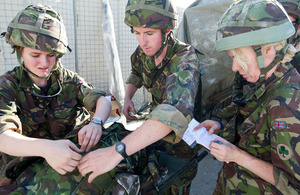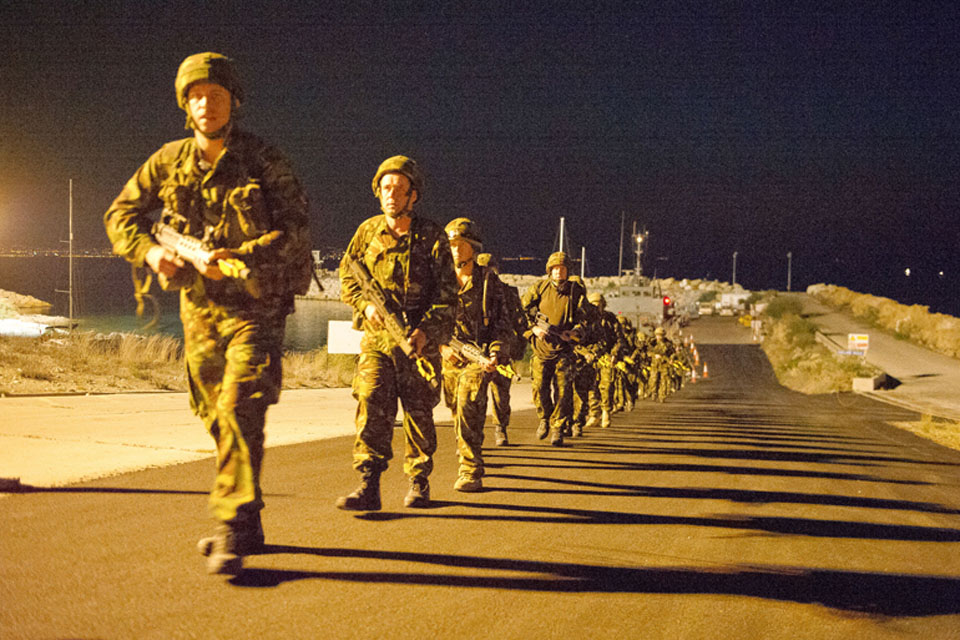Combat medic reservists learn infantry skills
Front line combat medics are being put to the test in a new overseas training exercise to make sure they are not only first-rate trauma medics but can also think and act like fighting troops on patrol in Afghanistan.

Reservist Combat Medical Technicians on Exercise Lion Star in Cyprus [Picture: Bombardier Murray Kerr, Crown Copyright/MOD 2012]
The soldiers, all volunteer reservists from 253 (North Irish) Medical Regiment, need to be able to patrol with fighting troops in some of the most treacherous areas of Afghanistan to give instant lifesaving first aid should the worst happen on a patrol:
Quite a few of these Combat Medical Technicians will deploy out to be based in forward operating bases with infantry units and go out on patrol with them to respond if the patrol takes a casualty,” explains Lieutenant Colonel Mark Haddock, Commanding Officer of 253 (North Irish) Medical Regiment.
When the worst happens all eyes turn to the medic so they have got to be fit enough to do the patrol and be part of it, including use their weapon if necessary before they can turn around and do their core role to save lives.
There is an awful lot of responsibility on Combat Medical Technicians in Afghanistan, and the similarity to what they will do if they deploy and what we are doing on this exercise is very close.
Every serial in the exercise will involve some kind of medical response, be it a basic first-aid-type casualty or a complex clinical-type-trauma, on top of their soldiering skills to make sure that they are not just able to get somewhere in good order, they are able to be medics at the end of it.
The specially-adapted infantry exercise Lion Star in Cyprus will see the medics race to a 0300hrs boat launch, then tab (march) 7km in full kit before they secure a hostile compound, all within the first few hours of the three-day final exercise. For the rest of the time the soldiers will have to react to the scenarios the training staff launch at them on the day to truly test their reactions.

Army medics on a 7km tab [Picture: Bombardier Murray Kerr, Crown Copyright/MOD 2012]
Combat Medical Technician Class 1 (equivalent to a paramedic) Corporal William Ross, who is an automation engineer in his civilian life, is keen to deploy in the next couple of years:
Our job is to save lives - we are the front line care as soon as anybody is injured, and if you don’t get that right there and then on the front line they are never going to make it back to the hospital. Basically you are a paramedic out on patrol.
I’m very proud of what our soldiers do in Afghanistan, so if I can go out and help them then I would really like to. This exercise is about digging deep and pushing yourself beyond your comfort zone, and I’m sure that if I can get through it then with a little more training I could keep up with infantry soldiers to deploy with them to Afghanistan.
Also keen to deploy when he completes his Combat Medical Technician training is 21-year-old Private Mark Webster who is on his first overseas training exercise:
I want to deploy alongside the soldiers and be able to make a difference if anything happens to them. As a TA soldier, especially with the announcement of Army 2020 and a greater integration with the Regular Army, we need to do the same things that they do. We do the same training, we wear the same uniform, and we can do the same job.
I still have more exams and training to do before I reach my Combat Medical Technician Class 2 level, which is the minimum you need to deploy, but I am well on the way as a Class 3. And this exercise has given me the chance to go over the key basic soldiering skills, with the medical ones, in a climate not unlike Afghanistan using helicopters and equipment that we would have over there.
The reservist medical regiments are well known to regular soldiers in Afghanistan, where they have deployed for many years alongside their regular counterparts, even before the Army 2020 announcement:
The reality is that the medical side of the British Army has been providing reservists for operations for a number of years, so the future force of Army 2020 is not new to us,” adds Lieutenant Colonel Haddock.
These guys see it as a natural thing to go out as an individual, or a collective organisation, to support the regular forces and we are comfortable with that.
One of the soldiers, not long back from Afghanistan, is Combat Medical Technician Class 1 Staff Sergeant Hayley Allen who works as an intensive care nurse in her civilian life. She spent six-and-a-half months deployed in Helmand province in 2010 and 2011 treating wounded soldiers as they arrived at the specialist intensive care and hospital facilities in Camp Bastion and Lashkar Gah:
It was much harder than I expected,” admits SSgt Allen. “Not because of what I saw but because of the numbers of those injured. I’m an intensive care nurse in Northern Ireland so I’ve seen pretty much anything you could expect to see, but I was shocked by the number of casualties who don’t always get the mention they deserve. They were young, many with children, and I had never experienced anything like it before.
Don’t get me wrong, I’d go back there tomorrow - which everyone who has been there would say because the reason we want to go back is to look after each other, but it’s the hardest thing I’ve ever done.
So for me this exercise is about passing on what I’ve learnt to those who are hoping to deploy,” adds SSgt Allen, who also deployed to Bosnia in 2003.
Cyprus is a hot, sunny, dusty environment so it’s a good place to pass that knowledge on, plus confirm what they already know about soldiering. If you are going to deploy you have to remember you are a soldier first and this exercise is what that is all about.
I’m very proud of what I do. I’m very proud of what the soldiers on the ground do. By comparison I don’t think I do very much. I just try and support them as best I can.
The exercise is due to finish on Friday with the soldiers returning home shortly after.